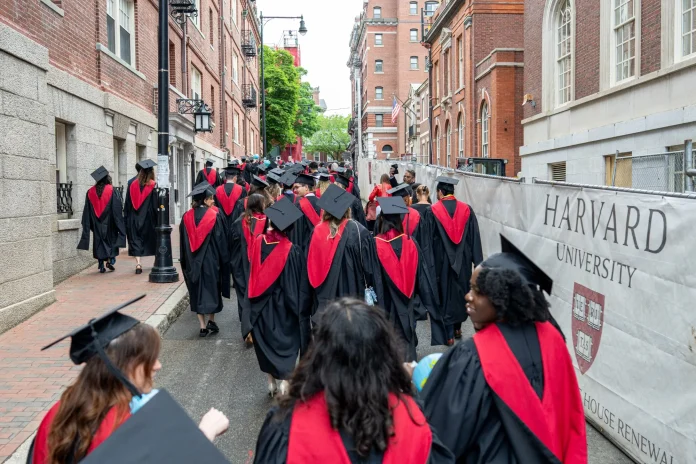A United States federal judge has granted Harvard University more time under an order that blocks President Donald Trump’s attempt to bar international students from studying there. The extension will stay in effect while the court considers a longer-term decision.
Judge Allison Burroughs of the US District Court made the ruling in Boston on 16 July. The original restraining order was due to expire on Thursday. It will now remain active until 23 June. The judge said she needed extra time to complete her ruling.
“We’ll issue an opinion as soon as we can,” Judge Burroughs said during the hearing.
She first issued the order on 5 June to stop Trump’s presidential proclamation from taking effect. A preliminary injunction would give Harvard longer protection as its legal challenge continues.
Harvard has around 6,800 international students. They make up roughly 27 per cent of the total student body. The university is based in Cambridge, Massachusetts.
Legal arguments over international student policy
Judge Burroughs did not reveal how she might rule. However, she noted that the government faced a difficult task proving that Harvard would not suffer serious harm if the ban took effect.
Harvard’s lawyer, Ian Gershengorn, described the impact as “devastating.” He argued that the Trump administration targeted Harvard for refusing to accept its influence. He claimed the order violated Harvard’s right to free speech under the First Amendment.
The Department of Justice disagreed. Lawyer Tiberius Davis said Congress had given the president broad powers to limit the entry of foreign nationals. He argued that Trump acted on national security grounds.
“We don’t trust them to host foreign students,” Davis said, referring to concerns about Harvard’s oversight.
Political disputes and legal action
The Trump administration had already taken several actions against Harvard. These included freezing federal grants and questioning its tax-exempt status. Harvard responded with legal action.
Two cases are now before Judge Burroughs. One aims to restore about US$2.5 billion in funding. The other seeks to stop the administration from restricting international student access.
On 22 May, Homeland Security Secretary Kristi Noem said her department had revoked Harvard’s certification for the Student and Exchange Visitor Programme. This move would have stopped the university from admitting international students. Judge Burroughs blocked the decision almost immediately.
The Department of Homeland Security has now shifted its strategy. It is reviewing Harvard’s certification through a slower administrative process. Still, Judge Burroughs has signalled plans to issue a broader ruling to keep current conditions in place.
National security and campus protests
On 29 May, President Trump signed a proclamation. It argued that Harvard was no longer a trustworthy steward of international student programmes. The proclamation suspended the entry of new foreign students for six months. It also directed Secretary of State Marco Rubio to consider cancelling existing student visas.
At the latest hearing, Davis cited Harvard’s acceptance of foreign funds, including from China. He also pointed to its slow response to requests for information on student activity during campus unrest. These were listed as national security concerns.
President Trump has also accused Harvard of allowing antisemitism to grow. He claimed the campus environment had become unsafe for Jewish students. Protests linked to the Israel-Gaza conflict have sparked debate at many US universities, including Harvard.
